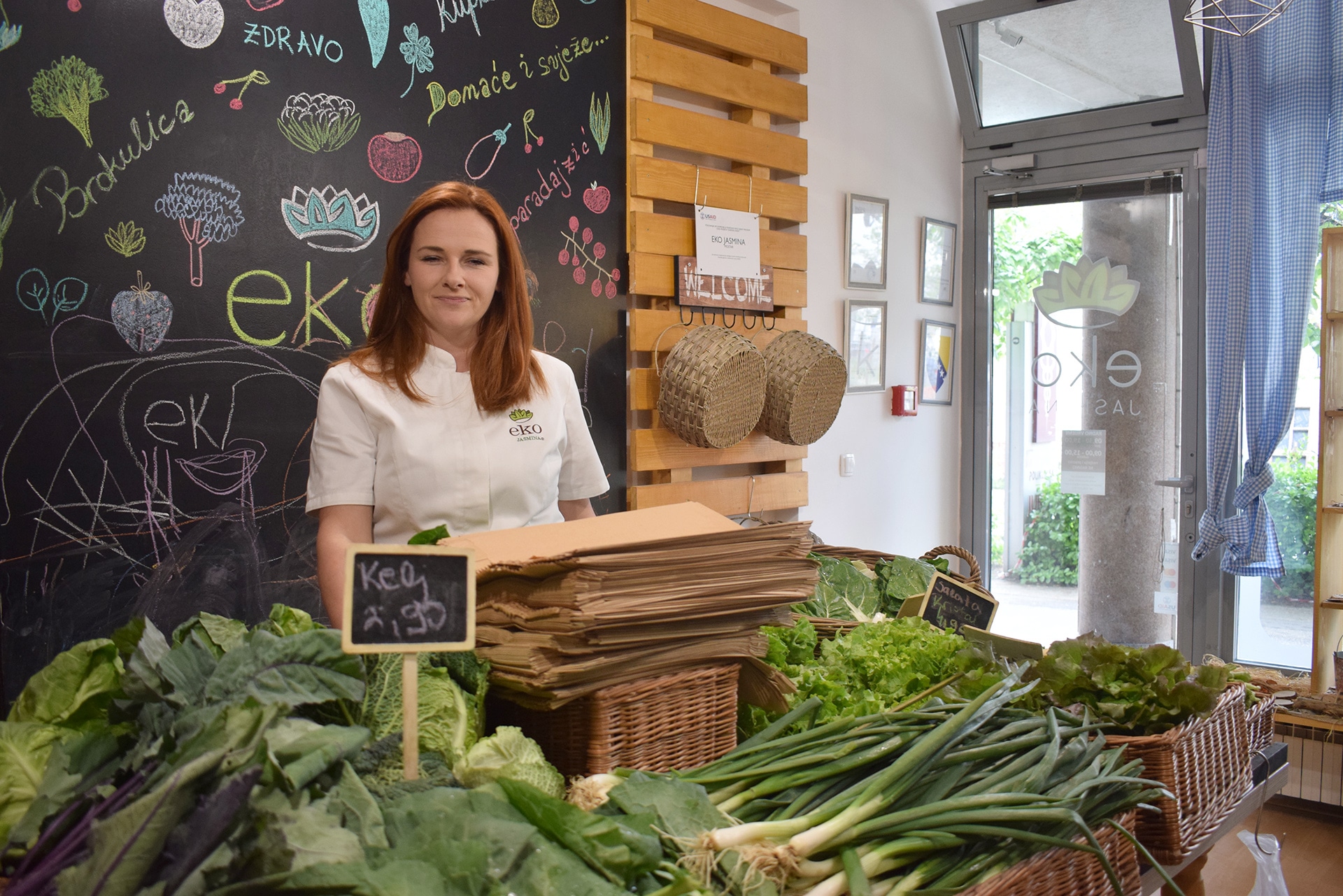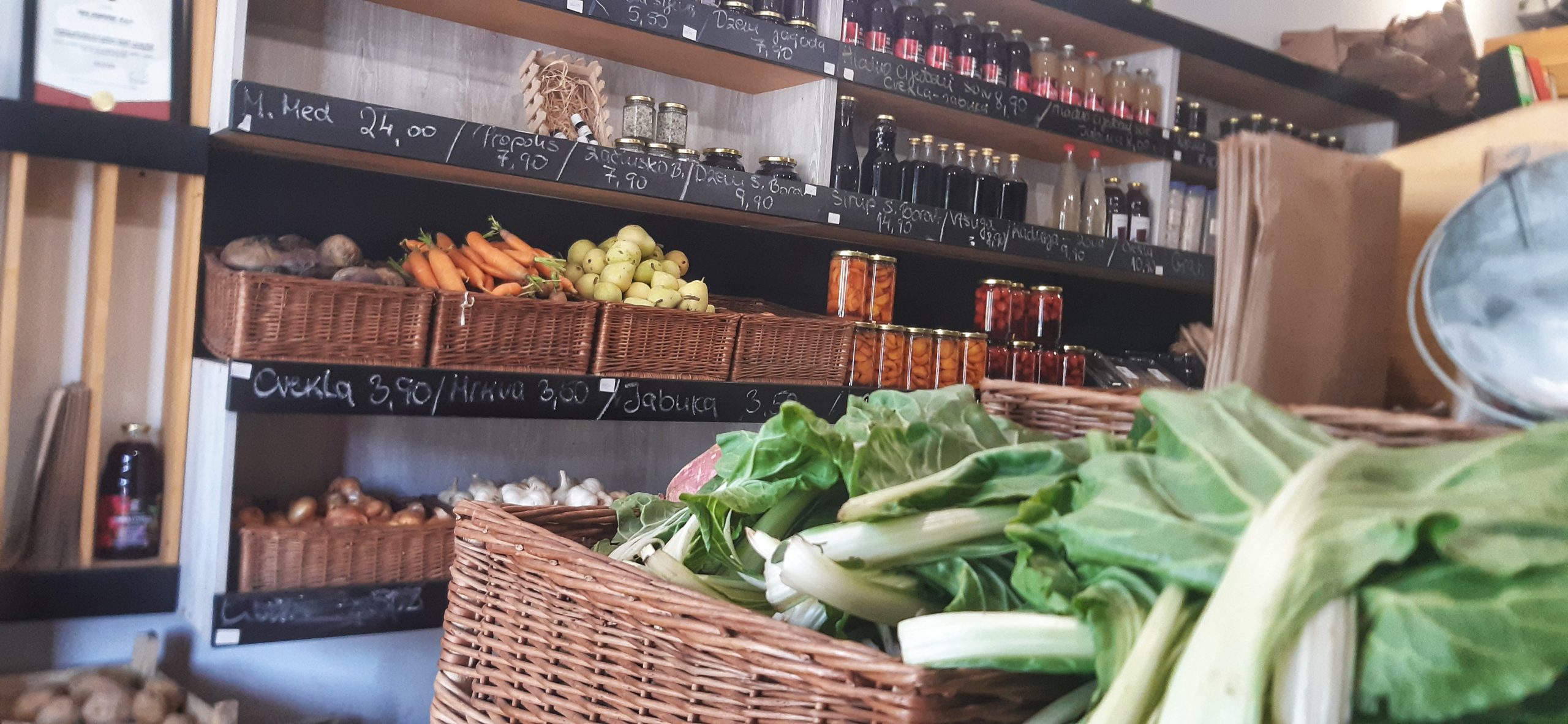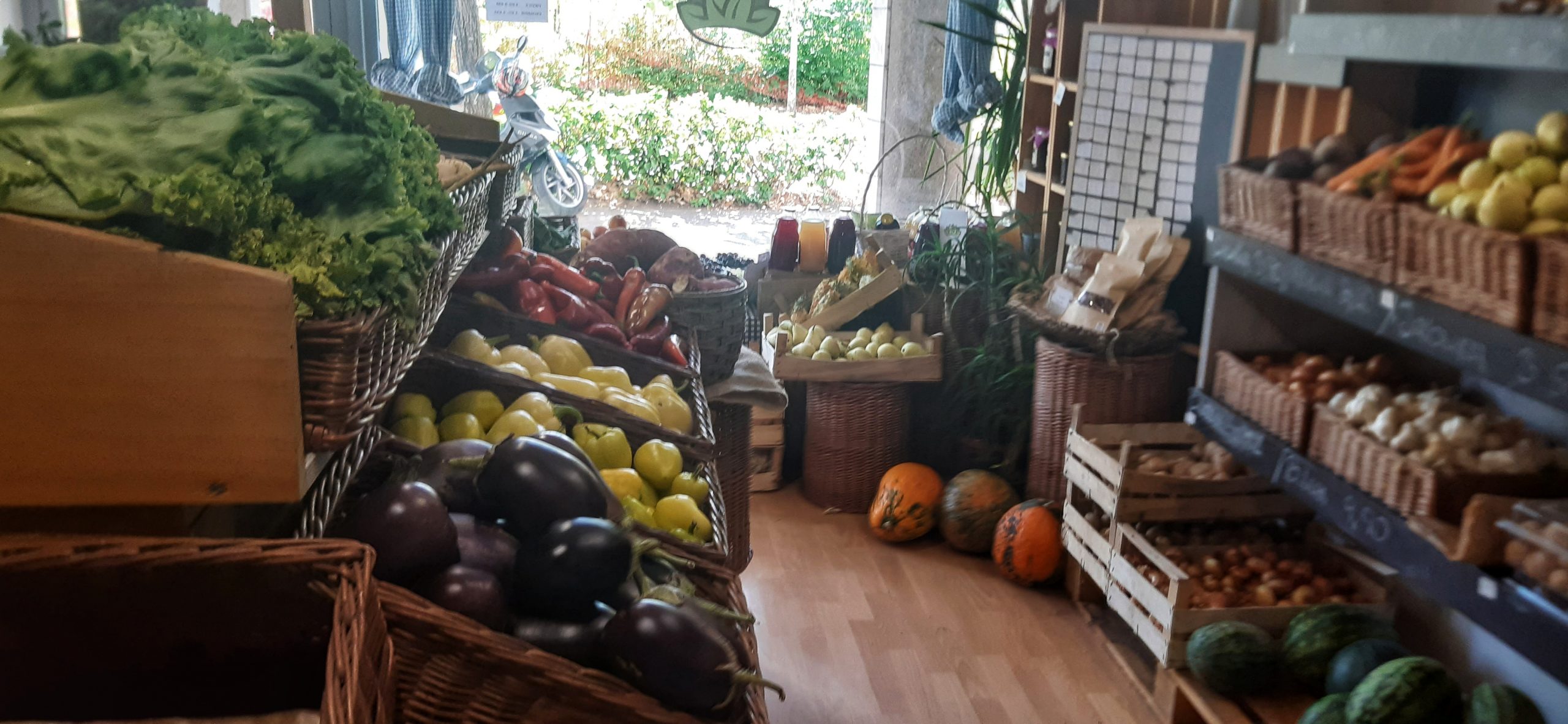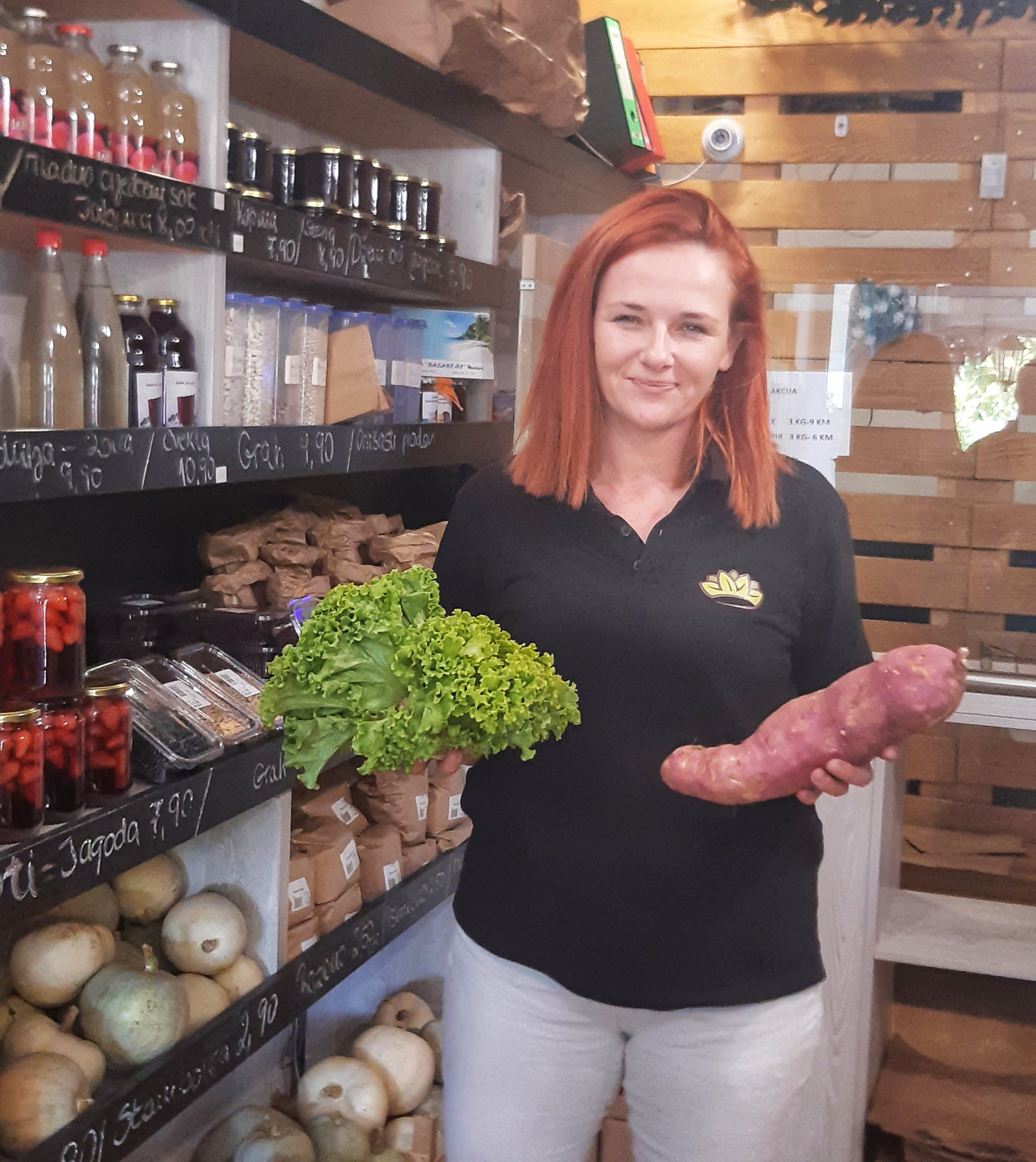
Mostar’s Jasmina Ćušić started Eko Jasmina, a small store for organic fruits and vegetables, five years ago to “revolt against the system in Bosnia and Herzegovina”.
Despite her advanced degrees as a graduate professor of the English language, Jasmina could not find a job because she was not a member of a political party. But something positive emerged from this situation – she has started a business which is growing stronger every day and attracting more and more people.
Agriculture instead of a political affiliation
“I was told that I had to become a member of a certain political party to get a job in education. I didn’t want to be a part of that, so I embarked on my own adventure,” Jasmina says.
Agriculture, she says, was what was closest to her heart at the time. She grew up in the countryside and wanted to take advantage of the knowledge she already had. She thought running a small agriculture business could have big potential, so she decided to produce organic food. She received orders via Facebook and then brought them to her small stand in front of the Ero Hotel in Mostar.
At first, they only harvested three crops, but now they harvest 80 to 90 different fruits and vegetables. Jasmina says this is all thanks to the favorable Herzegovinian climate and fertile land.
“God has gifted us with good land, water, and a climate that is favorable for production year-round. In addition to producing typical Bosnian crops, we are also trying to introduce new crops and experiment with tropical fruits. We currently have kiwano, Peruvian strawberry, yellow watermelon, and sweet potato, which was a novelty three years ago. Our country is especially suitable for tropical fruits, because summer lasts almost from the beginning of May to the middle of October, and we have a lot of sunny days. We should take full advantage of these conditions,” explains Jasmina.

The pandemic strengthened the business
Although the coronavirus pandemic shut down many shops and wreaked havoc on farmers throughout Bosnia and Herzegovina, Eko Jasmina did not feel its consequences. Jasmina says that they were among the first to try to comply with all prescribed epidemiological measures.
“We had to adapt to all kinds of situations because it was very important to pack our products without making any physical contact. How our products were packed, who packed them, and how they were delivered became very important. People recognized that we strictly followed the rules and cared about our customers’ safety, which helped us avoid the pandemic’s adverse effects on small businesses. I think it actually strengthened our business,” says Jasmina.
Jasmina says many people realized how important it is to have their own space for food production after the period of uncertainty at the beginning of the coronavirus pandemic.
“People think that agriculture is physically difficult or that it is only done by uneducated people who cannot do anything else. However, more and more educated people are turning to organic production because that is the future. I think that, given the increase in the global population and the need for food, people will increasingly think about having a small parcel of land in the countryside where they can produce food, at least for themselves,” says Jasmina.
Organic food tour throughout BiH
There is no time to rest for Jasmina and her team. Every day is different. They are in Sarajevo on Mondays and Thursdays, Zenica on Tuesdays, Tuzla on Wednesdays, and Banja Luka on Fridays. After that, they go to western Herzegovina, including Široki Brijeg, Ljubuški, Grude, Međugorje, and Čitluk.
“Every day is a rollercoaster, something new is always happening, and it’s never boring. In the afternoon, we are usually in a field in Višnjići or Nevesinje. That’s my Bermuda Triangle together with Mostar [laughs]. We’re always at one of those locations. If we have nothing to do, then we enjoy nature because that, at least for me, is my greatest pleasure,” says Jasmina.
Although the only brick-and-mortar store for Eko Jasmina is in Mostar, they plan to open a store in Banja Luka soon. They also plan to organize easier delivery methods.
“We recently signed a contract with BH Post to create a new food delivery program, where vegetables will come directly from the field to the consumer in a much shorter period. Currently, in every city, we have our stand where people come and take their orders. We’ve had a lot of offers to sell in retail chains, but so far, I have refused to do that because I don’t trust the people who work there, and I can’t be sure that they wouldn’t sell products that aren’t mine under my name in the event of a product shortage. Since I can’t control it, I didn’t want to agree to it,” says Jasmina.
Every year, as she says, the biggest’ boom’ is strawberries. As a result, she has to start taking orders in January, and she can attract upwards of 50 customers in a very short time.
“During the first lockdown, we announced at 11 pm that strawberries were coming to the store. When we arrived at the store the next morning, customers were lining up. So I can say that strawberries are the most in-demand every year,” Jasmina says.

Agriculture as a “male” business
Despite being the third daughter of five children in a large patriarchal family, Jasmine was not “saved” from certain jobs. She had to do everything.
“I’m used to fighting through life. It wasn’t difficult for me to decide to go on this adventure and create my own private business. I think I would regret it later in life if I had remained under someone else’s authority, or if I had owed someone a favor for the work I do, or if I were beholden to a political party for my job. I wanted my freedom, and I knew how much I would pay for it. But, for me, my freedom is invaluable,” says Jasmina. She says she has also commanded respect from men who have been in this business for a long time because they know how difficult it is to succeed.
Although BiH has great natural climate conditions for agriculture and has become more organically conscious, Jasmina believes it has not lived up to its potential. She points out that, compared to Slovenia, which has 3,000 organic producers for its small population, Bosnia and Herzegovina has fewer than 100.
“The European Union has a condition that 0.3% of arable land should be used for organic agriculture. In our country, it is currently at 0.003%, so there is a lot of room for the development of organic agriculture. The only thing missing is greater support from the state. I think that the state should engage and support more young people in organic agriculture, especially in larger cities such as Sarajevo or Banja Luka, because people there are more aware of what they eat and have greater purchasing power,” says Jasmina.
According to Jasmina, healthy food is becoming a trend, and demand for it is going up. Although the market is constantly increasing yearly, farmers still do not see the profit from organic production and continue to damage arable land with numerous toxins, offering low-quality fruits and vegetables on the shelves of various retail chains.
“If a farmer pollutes the land for the next 20 years, it must be painstakingly cleaned to produce anything healthy on it later. Generationally, we are destroying entire areas, entire plantations, and we will have to pay the price at some point. Luckily, we still have a lot of free arable land. I hope that organic producers will occupy this land so that we will not have any problems later,” says Jasmina.
If small businesses can’t benefit from the state, they have the option to seek support from various NGOs. Through one such project with USAID, Jasmina bought a new tractor. However, some manufacturers give up after the first year of operation due to high financial costs.
“Our government system is designed to make small companies pay very high taxes, as they do not have any government relief compared to other larger companies. All companies pay the same taxes, even though it doesn’t make sense. I think it is important to provide better conditions for small companies, to strengthen their foundation so they can build something bigger.”

A multiethnic team of people from 12 families
All fruits and vegetables at Eko Jasmina are harvested by 12 families from different backgrounds, with over 80 people employed through her business.
“We are a multiethnic team. There are Croats and Serbs, and Bosniaks. We all work together in our small eco-family. I was raised in a time without nationalism, and although I am a Muslim, I went to celebrate Christmas and Easter with others, and I welcomed people from other backgrounds to my home for Eid. I wanted to show that we can work together and we can live together, especially in Mostar. The store is open in Center 2 (in the western part of Mostar), but I have never had any problems. Wherever I go, people greet me with open arms,” says Jasmina.
Jasmina also says that there is plenty of space for young people who want to pursue this type of job because there is enough arable land for everyone.
“It wasn’t until I started doing this that I saw how many things we are missing in the country. For example, I can’t sell organic food in plastic bags, so we use paper packaging, and we found only one company in BiH that produces it from recycled material,” explains Jasmina the need for producers to harmonize organic production with ecological principles.
Despite financial and conceptual support through various projects, she states that she has had several negative experiences with organizations and does not recommend them because, as she says, they take over a large part of co-ownership of businesses and thus the ideas of small producers fail.
She tells young producers that there is are a lot of risks involved, but they need to invest their time and go into it with their heart: “You always have to think long-term and sometimes make sacrifices if you see that this is good for the company in the long run,” says Jasmina.
She always pays attention to what customers ask her, and they always get what they pay for; that is her mantra.
“Our prices may be higher than those at the market, but no one at the market can drag you to the field where your produce was planted; I can do that,” concludes Jasmina.
You can search for Eko Jasmina products on social networks: Instagram – eko.jasmina & Facebook – ekojasmina.







